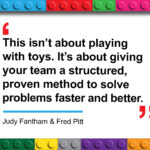Introduction
In the first post in this series, we explored The Changing Role of the Salesperson. Building on the theme of change, we’ll explore the related and equally critical change in the relationship between Sales and Marketing both during and beyond the Pandemic.
Sales Enablement as a Fundamental Pivot Point
The evolving virtual sales model and the transition of the traditional salesperson to a Subject Matter Expert and Brand Ambassador are driving the need for a fundamental pivot in the relationship between sales and marketing. Marketing should no longer be seen as a sales support function that is primarily focused on advertising and promotions – we need to move to a full partnership between sales and marketing with a focus on the complete Customer Lifecycle and the underlying Customer Experience.
I’ll start with a simple definition of Sales Enablement and then discuss the primary implications for Marketing and Sales respectively.
Sales Enablement Defined
According to strategy and research company TOPO (now part of the Gartner Group) Sales Enablement is defined as “the process of providing the sales organization with the information, content, and tools that help sales people to sell more effectively”. Organizationally, these responsibilities were traditionally spread across product marketing, sales operations, and sales training. In the most effective implementations, sales enablement is now supported by dedicated teams and technology funded within an integrated sales and marketing organization.
Marketing Implications
At the heart of the Sales Enablement model are four main pivot elements – content management, real-time knowledge, automation and training. Content management is the starting point – creating and effectively delivering meaningful, tailored and timely content to all the customer personas involved in the customer decision making process. This is the core of building market awareness for your company and establishing credible Subject Matter Experts (SMEs). With the content strategy in hand, the focus shifts to the tools and outlets for delivering the content and tracking the impact. Training for your sales team needs to be an ongoing focus. This training includes extended product expertise, broader market knowledge and effective use of the sales and marketing tools to optimize their virtual or live engagement with customers.
From a process perspective, with a clear focus on Sales Enablement, Marketing can now take a closed-loop approach. This will ensure a complete understanding of the investments and returns and allow Marketing to manage all sales support programs on a near-real-time basis to allow dynamic adjustments and to maximize the impact.
Sales Implications
The primary sales implication is the need to embrace change. The core change is moving beyond in-person interaction and personal relationships as the single or primary sales strategy. The sales team needs to dedicate significant effort to market awareness and recognition to effectively be positioned as SMEs. To do this, Sales will fully engage with Marketing with an emphasis on content development and Social Media engagement making full use of the Sales Enablement tools. Sales also plays a key role in aligning the closed loop marketing model with the optimum sales process and plays a critical role in nurturing the opportunities that are generated.
Finally, your sales team should look at Sales Enablement as an opportunity for personal development, including the new tools and techniques and the broader responsibilities and visibility inherent in becoming an SME. As travel limitations are lifted, SMEs can remain in these expert roles, actively engaging with key clients in support of the broader sales force.
With this partnership and the new roles fully understood, your organization will be well positioned to address the evolving requirements of the customer experience. That leaves one other topic in this series to address – a frank assessment of what your company is selling and to whom. Join me soon to explore The Need for Clarity and Focus.
This post on The Changing Relationship between Sales & Marketing is part 2 of a 3-part series that outlines critical considerations for the Customer Experience. Stay tuned in the coming weeks for part 3 – The Need for Clarity and Focus.






